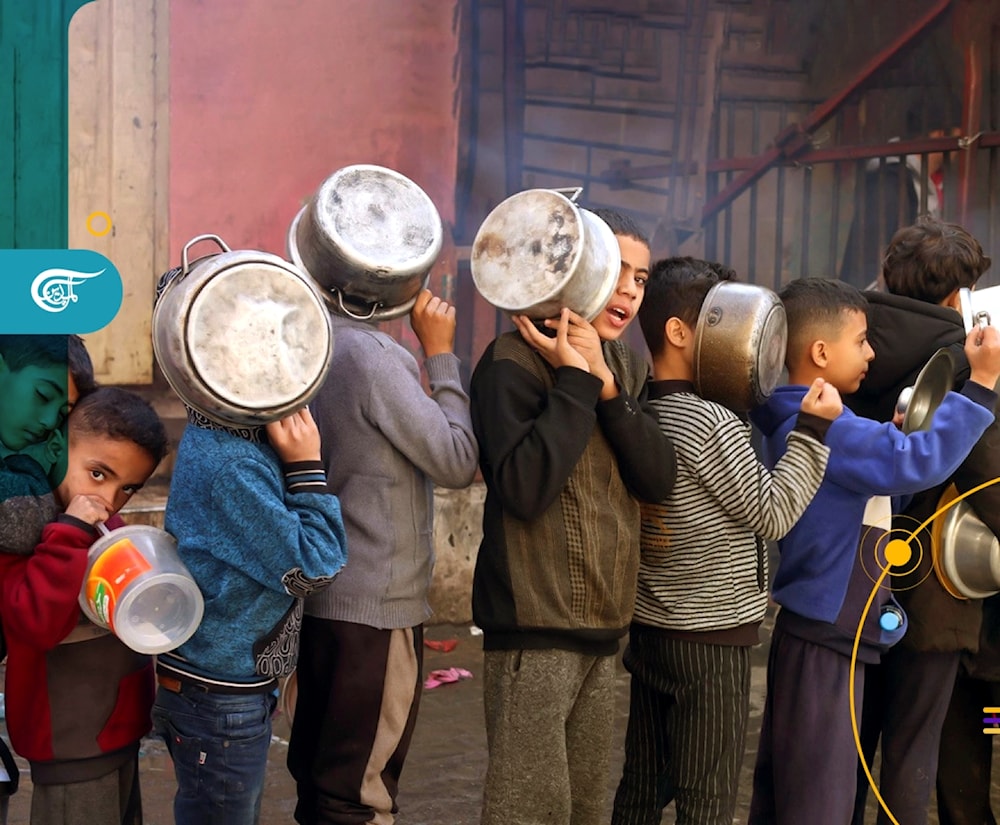What are you eating, Gaza?
The Israeli enemy has succeeded in one thing in this war: Removing class differences, since the rich are not better off than the desperately poor, either in the type of food they eat or even in quantity.
-

Yes, people weren’t very well-off before Al-Aqsa Flood, but getting 200g of chicken or frozen meat wouldn’t exactly break your budget. not like now... (Al Mayadeen Net)
Abou Nader has just come to the realization that he overspent in the food he got for his five children, all for an inopportune selfishness and luxury. He shouldn't have sold his three sacks of animal feed to buy just one kilo of fresh meat, which he and his children craved whenever they by passed the local butcher shop in Jabalia Refugee Camp, in northern Gaza.
Logically speaking, what the 50-something-year-old did was not wrong. After all, his entire herd was decimated when he was forced to move out of al-Sikkeh neighborhood, east of Jabalia, for more than a month and a half, after Israeli tanks stormed the neighborhood. 11 sheep, all killed, some by shrapnel, while thirst and hunger killed off the rest. So why keep the fodder? He, himself, had thought about that, as he didn't expect that the more than 500,000 trapped in the north of Gaza would reach a point where they would have to mill animal feed to make bread. This is the end of the biggest story of commercial disappointment in 2024, as the man, and thousands of others like him, are now roaming the streets in search of a single kilo of that same shoddy kind of animal feed to make bread with.
“A single kilo, whose price is now at $5, is enough to make 12 loaves that even chickens wouldn't eat; and that’s enough to sustain a family for only a single day,” the quinquagenarian told Al Mayadeen Net, adding, “And that’s assuming they’ll have two meals a day, meaning, two loaves dipped in Zaatar [thyme] or ground red pepper.”
Before Al-Aqsa Flood, foodstuff manufactured by Maggi [a company known for its soup and noodle recipes] was not found in most Gazans’ homes. In fact, parents and children often fought over whether they would have chicken or meat for their meals. Yes, people weren’t very well-off, but getting 200g of chicken or frozen meat wouldn’t exactly break your budget. Hani Matar, a roaming coffee salesman says, “When things were tough, we’d get chicken necks or backs, the kilo would only cost us 5 shekels ($1.37), or you’d get 200g of frozen meat for that same price, and we’d get by on that. But today, there’s none of that, today Maggi packets are the richest things in our diet.”
The Israeli enemy succeeded in one thing in this war: Removing class differences, since the rich are not better off than the desperately poor, either in the type of food they eat or even in quantity. Abdallah Jamal says, “I’ve been an electronics dealer my whole life. I have $3,000 in my wallet now. I swear I’ve been searching the market for two hours now and I haven’t found a single kilo of flour, not one kind of canned food, not even rice or lentils.”
Not far from the Camp’s marketplace, in al-Hoja Street in the center of Jabalia Refugee Camp, sat Abou Mahmoud Al-Hessi, a sexagenarian, holding a plate half-filled with wheat since morning. Once an instructor at the Islamic University in Gaza, he’s now under the sun, separating the wheat from other kinds of grain. “This here’s bird feed, I’ll separate it from corn, barley, and god knows what else," he says.
“Are you going to grind them?”
“Sure not! This is our food for the day, with a bit of Maggi and water. Put it over a fire, and you’ll get the tastiest soup.”
The market north of the Gaza Valley (Wadi Ghazza) gives you a false impression. Although thousands gather there, vendors only have beverages and condiments there, a far cry from a meal, from spices to pickles, Nescafe, soft drinks, and candy for children.
Umm Saber al-Kafarneh, a sexagenarian who runs a stall in Jabalia Camp, says, “Everything you see on this stall here is useless. No one’s going to buy fish spice when you don’t have any fish. Why would anyone buy frying oil when there aren’t any potatoes or anything to fry? What’s a tomato sauce good for if you don’t have macaroni? That’s all I have here.”
But then come the difficult questions, as you wonder how thousands can survive. "What are you eating these days?," I asked Umm Hamed.
“I swear, I don’t know how we’re getting by, we’re living day by day, the kids are going to bed hungry, and we eat whatever we can find. Half an orange, lemon, and salt. May God help us get by.”
Elsewhere, far away from the refugee camps and semi-safe aspects of civilization, someone decided that if children starved and their parents couldn’t feed them, then nothing in this life is worth holding on to. Thousands of men walked over 20km to where the only aid truck was allowed to pass (thanks to international pressure).
Despite the zone being a deathtrap of artillery and sniper fire, the hungry have little options left. Hours had gone by when we heard the news. Israeli tanks shelled the truck… 20 martyred and 150 injured.
They were brought back home either as lifeless bodies or drowning in their own blood but still hungry...

 5 Min Read
5 Min Read








